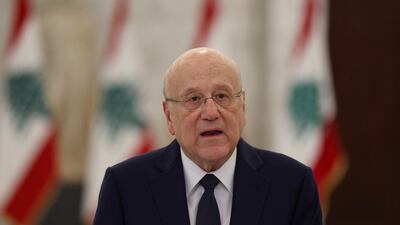Najib Mikati was named as Lebanon's prime minister-designate by President Michel Aoun on Thursday after consultation with parliamentarians.
Mr Mikati, who is currently serving as caretaker prime minister and is a billionaire who has already served in the role three times, received the support of 54 of the 128 members of parliament.
He will continue in a caretaker role until a government is formed, an often drawn-out and complicated affair.
Lebanon's political divisions are more entrenched than ever, meaning Mr Mikati faces an uphill task in forming a Cabinet that will satisfy the country's main players.
A devastating economic crisis that began in 2019 has plunged many Lebanese people into poverty and led to the local currency being devalued by more than 90 per cent.
The country is struggling with power cuts and extensive shortages of medical items and other vital supplies.
Speaking from the presidential palace in Baabda, Mr Mikati called on Lebanon's various factions to put aside their personal disputes and come together to save the country from various crises afflicting it.
He said it was a “collective responsibility” to do so, with Lebanon facing either “total collapse or gradual rescue”.
Mr Mikati also underlined the need for co-operation with parliament to approve legislation required to secure a bailout from the International Monetary Fund.
Lebanon’s recently elected parliament held binding consultations on Thursday with Mr Aoun over whom should be chosen as prime minister after last month's nationwide elections.

Two names had emerged as the main contenders during the consultation process: Mr Mikati and Nawaf Salam, a judge and Lebanon’s former envoy to the UN. The latter received the support of 25 MPs.
Mr Salam had been backed by Walid Joumblatt’s Progressive Socialist Party, the Kataeb Party and several new parliamentarians with close links to the protests in October 2019 that led to the downfall of the government led by Saad Hariri.
That was not enough to bridge the gap as Mr Mikati received the support of the two main Shiite groups in Lebanon — the Iran-backed militant group and political party Hezbollah and its ally Amal, which is headed by parliament speaker Nabih Berri.
The consultation with Mr Aoun was marked by a high abstention rate, with 46 MPs refusing to name any candidate and one boycotting proceedings altogether.
The majority of the abstentions came from Lebanon's two largest Christian parties — the Lebanese Forces and the Free Patriotic Movement. The latter was founded by Mr Aoun.
Mr Mikati received around 20 fewer votes than when he was last designated as prime minister last September.
In Lebanon's sectarian power-sharing system, the prime minister is a Sunni Muslim, the president a Maronite Christian and the parliament speaker a Shiite Muslim.


